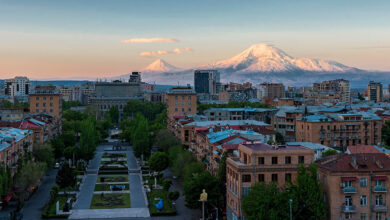The Armenian Genocide and Beyond: The Road to Deir al-Zor

The National Interest has published an article titled “Armenian Genocide and Beyond: The Road to Deir al-Zor,” in which author Benny Morris refers to the Armenian Genocide, the comemoration of its centennial, Turkey’s move to mark Gallipoli anniversary on April 24. Below is an excerpt form the article:
This year Turkey moved its Gallipoli anniversary commemoration, traditionally marked on April 25—the day the Allies landed on the peninsula just west of Istanbul—to April 24. April 24, of course, is the day on which Armenians around the world have traditionally commemorated the slaughter of their forefathers by the Ottoman Turkish government. That day, in 1915, the police in Constantinople rounded up some 250 Armenian leaders for deportation and death. This act was followed by systematic mass deportations and massacres.
This year was the centenary of both World War I events. President Recep Tayyip Erdogan, with his wonted crudity and cynicism, moved the Gallipoli remembrance by a day in order to overshadow the Armenian commemoration and divert international attention away from the Turks’ crime against humanity, considered by most historians to be the first genocide of the twentieth century.
All Turkish governments since World War I have denied Turkish responsibility for the mass murder and, indeed, have usually denied that it actually took place, explaining that a much smaller number of Armenians had died (much, incidentally, as Mahmoud Abbas, the Palestinian “president,” in his PhD thesis claimed that “only” several hundred thousand Jews had died during the Holocaust). Instead, Turkish governments have claimed that the Armenians, a disloyal people, had rebelled against the country and tried to stab it in the back during the war; that the Armenian victims were the result of clashes between armed rebels and the empire’s security forces; and that, if massacres occurred, they were the doing of overzealous local officials and/or Kurdish tribesmen, rather than a product of the policy of the central government, which had merely ordered the removal of Armenians from war zones.
Few, if any, of the foreign dignitaries who attended Erdogan’s festivities at Gallipoli, including princes Charles and Harry from Great Britain and the prime ministers of Australia and New Zealand, whose troops had participated in the landings on the peninsula, were probably aware of the grim irony that undercut the Turkish celebrations.
Click here for the full article.










